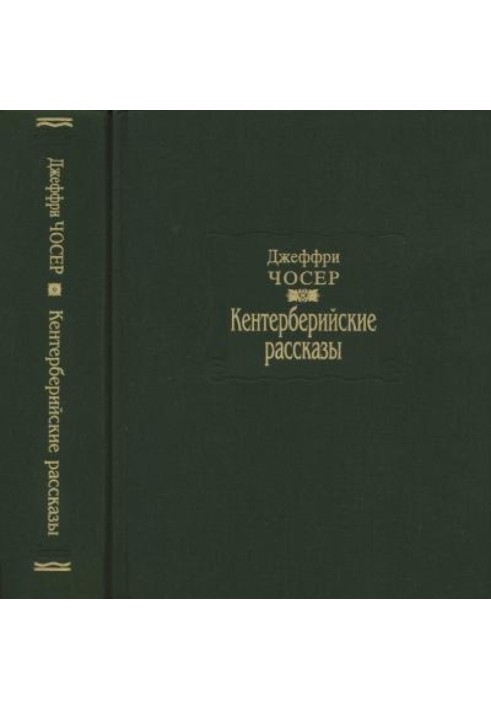The Canterbury Tales
 Instant download
Instant download
after payment (24/7)
 Wide range of formats
Wide range of formats
(for all gadgets)
 Full book
Full book
(including for Apple and Android)
The proposed book is the first complete academic edition in Russia of “The Canterbury Tales” by Geoffrey Chaucer, one of the most famous and important monuments of English literature of the late Middle Ages (XIV century). Chaucer did not have time to complete The Canterbury Tales; they have reached us only in part. The book contains translations of all ten surviving fragments of the monument, arranged in the same order as in the most authoritative manuscripts. In the "Additions" section, Chaucer's lyrics are given. In the “Appendices” the reader is offered articles about the creative path of Chaucer, about the literary parallels of this monument with the work of Russian writers: Gogol, Tolstoy, Dostoevsky. CONTENTS: THE CANTERBURY TALES First fragment General prologue. Translation by I. Kagikin (7). The Knight's Story. Translation by O. Rumer (29).Melnik's prologue. Translation by I. Kashkin (83). Miller's story. Translation by I. Kashkin (85).Prologue of Majordomo. Translation by I. Kashkin (104). Majordomo's story. Translation by I. Kashkin (105). Prologue of the Cook. Translation by I. Kashkin (117). The Cook's story. Translation by I. Kashkin (118).Second fragmentPrologue of the Lawyer. Translation by I. Kashkin (120). Prologue to the story of the Lawyer. Translation by O. Rumer (123). The Lawyer's Story. Translation by O. Rumer (124). Epilogue to the story of the Lawyer. Translation by T. Stamova (151). Third fragment Prologue of the Bath Weaver. Translation by I. Kashkin (152). The story of the Bath weaver. Translation by I. Kashkin (176).Prologue Carmelita. Translation by I. Kashkin (187). The story of Carmelite. Translation by I. Kashkin (188). Prologue of the Bailiff of the Church Court. Translation by I. Kashkin (198). The story of the Bailiff of the Church Court. Translation by I. Kashkin (199).Fourth fragmentPrologue Student. Translation by I. Kashkin (215).Student's story. Translation by O. Rumer (217). Chaucer's conclusion. Translation by O. Rumer (247).Prologue of the Merchant. Translation by I. Kashkin (248). The Merchant's Story. Translation by O. Rumer (249).Epilogue to the story of the Merchant. Translation by I. Kashkin (277).Fifth fragmentSquire's Prologue. Translation by I. Kashkin (277). The Squire's story. Translation by O. Rumer (278).Epilogue to the Squire's story. Translation by I. Kashkin (294). Franklin's Prologue. Translation by I. Kashkin (295). Franklin's story. Translation by O. Rumer (296). Sixth fragment: The Doctor's Story. Translation by O. Rumer (317). Epilogue to the Doctor's story. Translation by I. Kashkin (324). Prologue of the Seller of Indulgences. Translation by I. Kashkin (325). The story of the Seller of Indulgences. Translation by I. Kashkin (329). Seventh fragment of the Skipper's Story. Translation by I. Kashkin (342).Epilogue to the Skipper's story. Translation by I. Kashkina (353). Prologue of the Abbess. Translation by T. Popova (354). The story of the Abbess. Translation by T. Popova (355). Prologue to the story about Sir Topas. Translation by I. Kashkin (360). The story of Sir Topas. Translation by O. Rumer (361). Prologue to the story of Melibaeum. Translation by I. Kashkin (367). The story of Melibaeus. Translation by T. Popova (368).Prologue of the Monk. Translation by I. Kashkin (394). The Monk's story. Translation by T. Popova, O. Rumer (397). Prologue of the Monastery Chaplain. Translation by I. Kashkin (418). The story of the Monastery Chaplain. Translation by I. Kashkin (420). Epilogue to the story of the Monastery Chaplain. Translation by I. Kashkin (436). Eighth fragment: The story of the Second Nun. Translation by O. Rumer (436). Prologue of the Canon's Servants. Translation by I. Kashkin (451). The story of the Canon's Servant. Translation by I. Kashkin (455). Ninth fragment Prologue of Economy. Translation by I. Kashkin (474).Econom's story. Translation by I. Kashkin (477). Tenth fragment Prologue of the Priest. Translation by I. Kashkin (485). The Priest's Story. Translation by T. Popova (487).Preces de Chauseres. Translation by T. Popova (539).ADDITIONSChaucer's lyricsAlphabet. Translation by T. Stamova (543). To mercy. Translation by T. Stamova (548). A petition to his mistress. Translation by T. Stamova (551). The plaintive song of Mars. Translation by T. Stamova (554). The plaintive song of Venus. Translation by T. Stamova (563).Rosamunde. Translation by S. Buntman (565). Praise to a woman. Translation by T. Stamova (566). Message to Adam, personal scribe. Translation by S. Buntman (567). Childhood of humanity. Translation by T. Stamova (567).Fortune. Translation by T. Stamova (569).Truth. Translation by T. Stamova (571).Nobility. Translation by T. Stamova (572). Impermanence. Translation by T. Stamova (572).Chaucer's Message to Skogan. Translation by T. Stamova (573). Advice to Buckton regarding marriage. Translation by S. Buntman, Edited by T. Stamova (575). Chaucer's petition to his bag. Translation by T. Stamova (576). APPENDICES “Human Comedy” by Geoffrey Chaucer (A.N. Gorbunov) (579). “Rhyme in England is poor” - Chaucer’s lyrics (A.N. Gorbunov) (735). Abdications: Chaucer and Tolstoy (A.N. Gorbunov) (749). Crooked roads: Chaucer and Gogol (A.N. Gorbunov) (773). The hypocrite and his victim: a tragic plot twist (From “The Canterbury Tales” to “The Village of Stepanchikovo” (A N. Gorbunov) (790). Notes (Compiled by B. S. Makarov, I. I. Lisovich) (819). Main dates of the life and work of Geoffrey Chaucer (Compiled by A. N. Gorbunov) (946). List of illustrations (947).
Data sheet
- Name of the Author
- Джеффри Чосер
- Language
- Russian
- Translator
- Иван Александрович Кашкин
Осип Борисович Румер
Сергей Александрович Бунтман
Т. Попова
Татьяна Юрьевна Стамова












